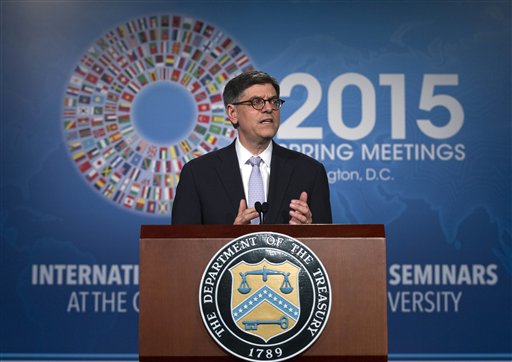Global finance leaders see economy strengthening

Treasury Secretary Jacob Lew speaks during a news conference during the International Monetary Fund and World Bank meetings in Washington, Friday, April 17, 2015. AP
WASHINGTON — Financial officials from the world’s major economies on Friday welcomed modest improvements in the global economy while side-stepping fears rattling global financial markets that Greece will default on its bailout loans.
The officials from the Group of 20 issued a joint communique that pledged greater efforts to boost confidence and reduce economic vulnerabilities. The meetings’ chairman, Turkey’s Deputy Prime Minister Ali Babacan, said the problems confronting Greece did not come up during the two days of official discussions.
While Greece wasn’t on the official G-20 agenda, it was a hot topic on the sidelines of the finance meetings, which were to conclude Saturday after discussions among the policy panels of the 188-nation International Monetary Fund and its sister lending group, the World Bank.
US Treasury Secretary Jacob Lew said he stressed in a series of one-on-one meetings, including discussions with Greek Finance Minister Yanis Varoufakis, that it was urgent that the debt negotiations be resolved quickly.
“I reiterated throughout these talks that failure to reach an agreement would lead to immediate hardship in Greece and increased uncertainties for Europe and the global economy,” Lew told reporters at a news conference late Friday.
Greek officials said they planned to meet representatives of the country’s creditors Saturday in a search for “common ground.” The country, which has relied on loans from the international community since 2010, is fast running out of cash with concerns mounting that it could miss two debt payments due in May to the IMF.
Fears that Greece could default on its debt and abandon the euro currency group sent shockwaves through global markets Friday. After being down nearly 360 points, the Dow Jones industrial average recovered a bit to finish down 279.47, a drop of 1.5 percent.
Some finance officials expressed their frustration with Greece’s new left-wing government, elected in January. Luis de Guindos, Spain’s economy minister, said the Greek government had sent “contradictory” signals regarding the negotiations.
“We have wasted very precious time over the last three or four weeks,” de Guindos said in an interview with The Associated Press.
“The communication of the Greek government has not been great. They have not made a lot of friends,” he said, while adding, “I expect and I hope that the communication will improve.”
The United States also came in for heavy criticism during the meetings from other nations unhappy that Congress has still not approved the legislation needed to put into effect IMF reforms that have been stalled for the past five years. The reforms would boost the IMF’s resources to deal with countries facing financial troubles and increase the voting power of fast-emerging economies such as China, Brazil and India.
Lew said he had assured his fellow finance ministers that the Obama administration still believed it would soon overcome objections from Republican lawmakers and win approval in Congress for the IMF reforms. The United States is the IMF’s largest shareholder and congressional approval is the last hurdle to putting the reforms into effect.
Chinese Vice Finance Minister Zhu Guangyao said in a speech Friday that the failure to pass the IMF quota reforms had damaged the reputation of the IMF and the G-20 and the image of the United States.
Growing frustration has caused other major countries to examine ways to break the stalemate, an approach that could lessen America’s influence on global economic issues if US critics were successful.
Japanese Finance Minister Taro Aso, speaking to reporters after the G-20 meeting, noted the growing dissatisfaction over the stalemate and said: “There are other camps who are saying we can leave the US behind and do something else. However, there’s a voting power being held by the United States, so it’s not realistic to think about other ways.”
As the largest shareholder, the United States is the only country with the power to veto key actions at the IMF.
In remarks prepared for the finance officials, Lew also warned South Korea, Germany, China and Japan to do more to boost consumer demand in their own countries instead of relying on exports to the United States and elsewhere for growth.
Babacan told reporters that officials did discuss risks to market stability that could come when the Federal Reserve begins to raise interest rates. Babacan has said there was a view that the Fed is doing a better job of providing guidance about its future moves.














